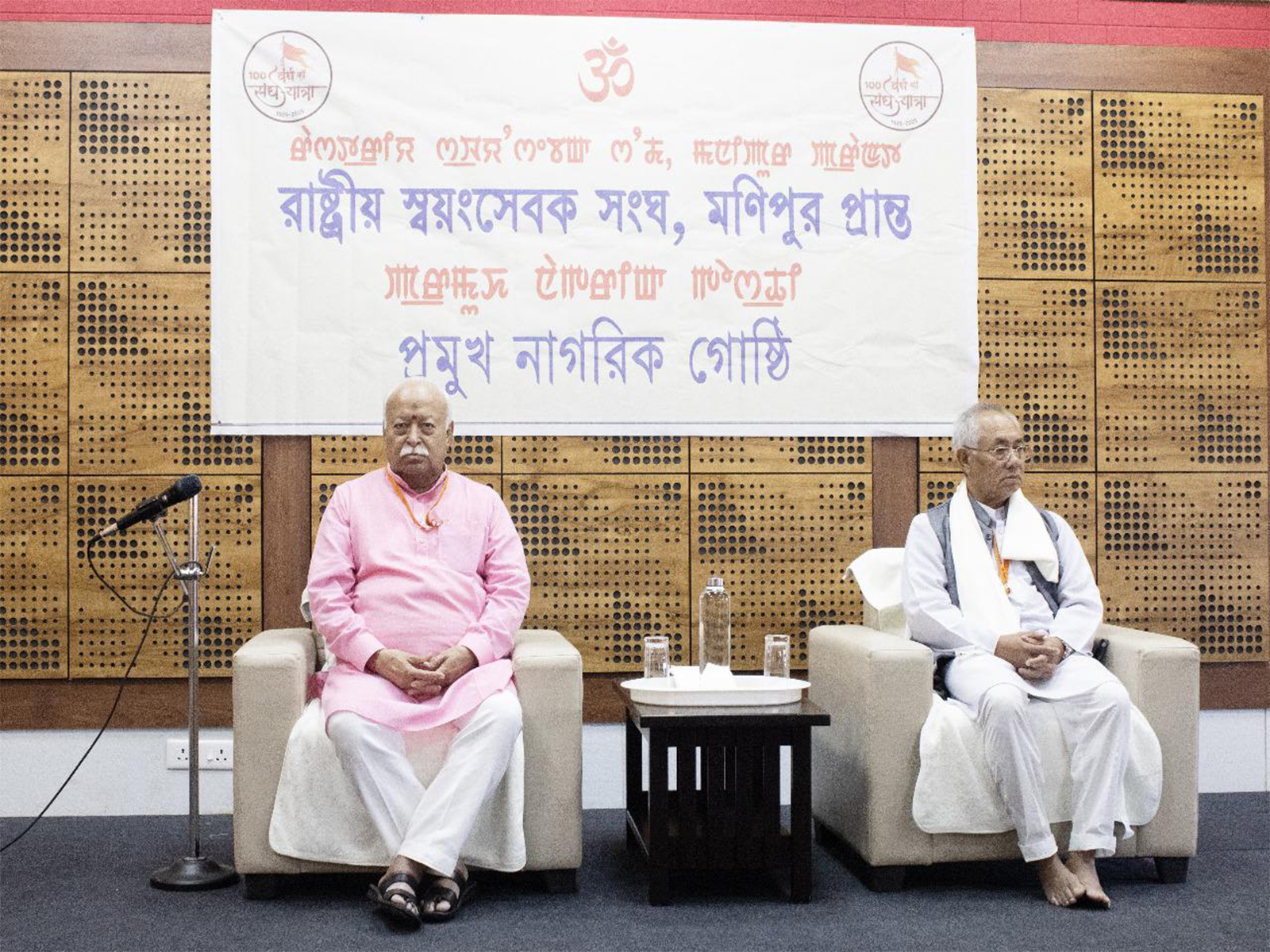Imphal (Manipur) [India], November 21 (ANI): Rashtriya Swayamsevak Sangh (RSS) Sarsanghchalak Mohan Bhagwat addressed a gathering of dignitaries in Imphal on Friday, during the first day of his three-day visit to Manipur.
In his address, Bhagwat reflected on the Sangh’s civilisational role, national responsibilities, and the ongoing efforts for a peaceful and resilient Manipur, according to an official statement.
Bhagwat stated that the RSS continues to be a subject of daily discussion across the country, often shaped by perceptions and propaganda.
While stating that the Sangh’s work is unparalleled, he said, “There is no organisation comparable to the RSS, just as the sea, the sky, and the ocean have no comparison. The growth of RSS is organic and the methodology was resolved after 14 years of its foundation. To understand one has to visit Shakha. The objective of RSS is to organise the whole Hindu society including those who oppose the Sangh, not creating a power centre within the society.”
He highlighted that misinformation campaigns against the RSS began as early as 1932-33, including from sources outside Bharat (India) that lacked an understanding of Bharat and its civilisational ethos. The Sarsanghchalak stressed the need for understanding of the organisation based on truth rather than perception-driven narratives.
Recalling the life of RSS founder KB Hedgewar, Bhagwat underlined his academic excellence, born patriotic activities, and involvement in all streams of the then freedom struggle. He noted that Hedgewar’s realisation of the need for a united and qualitatively improved society led to the creation of the RSS. “The Sangh is a man-making methodology,” he said, urging people to understand the organisation through its shakha system on the ground.
He noted that the term “Hindu” in this context is a cultural and civilisational descriptor rather than a religious identity.
“It (Hindu) is not a noun but an adjective,” the statement added.
For a strong Rashtra, Bhagwat emphasised the need for “quality and unity”. The progress of a nation not only depends on leaders alone but on a strong and united society.
He praised the inclusive nature of Hindu thought, citing, “Ekam Sat Vipra Bahudha Vadanti.” Truth, compassion, purity, and austerity form the essence of Dharma, he said, adding that these values are the core of our Hindu civilisation.
“Vividhata (diversity) is not a myth. Diversity is the manifestation of inherent unity within the society,” he added.
Speaking on the country’s ancient nationhood, he said the our Rashtra emerged not through western state mechanisms but through the “tapasya” of great ancient seers for the welfare of humanity, with principles like Vasudhaiva Kutumbakam reflecting the universal vision of Hindutva.
Emphasising the need for expanding apanatva (sense of belonging), Bhagwat remarked, “As our societal strength increases, the world listens to us. Nobody listens to the weak. The mission of the Sangh is to nurture capable individuals for a strong and harmonious Hindu Samaj.”
He added that the RSS does not work for its own glory. “Tera vaibhav amar rahe Maa Ham Din Chaar Rahe Na Rahe. Such dedicated individuals are the Nayaks envisioned by our Gurus,” he said.
The RSS chief outlined the Panch Parivartan initiatives being undertaken during the centenary year of the RSS: Samajik Samarasata (Social Harmony), Kutumb Pravodhan (Family awakening), Paryavaran Sanrakshan (Environment protection), Swabodh (understanding our own identity and promoting swadeshi thoughts and products) and Nagarik Kartavya (Civic responsibility).
According to the statement, Bhagwat commended Manipur’s strong cultural traditions, including the wearing of traditional attire during special occasions and the use of native languages, and encouraged further strengthening of these traditions.
Regarding the current situation in the state, he stated that efforts are underway at both the community and societal levels to restore stability.
“Destruction takes minutes, but construction requires years, especially when done inclusively and without harming anyone. Peace-building requires patience, collective effort, and social discipline,” he observed.
He said that not everything could be expected from the government, and the responsibility of society is very much required. He called for people to be self-reliant as a society for a Swavalambi Bharat.
He also emphasised the need for skill development for an economically empowered society. (ANI)
Disclaimer: This story is auto-generated from a syndicated feed of ANI; only the image & headline may have been reworked by News Services Division of World News Network Inc Ltd and Palghar News and Pune News and World News
HINDI, MARATHI, GUJARATI, TAMIL, TELUGU, BENGALI, KANNADA, ORIYA, PUNJABI, URDU, MALAYALAM
For more details and packages













